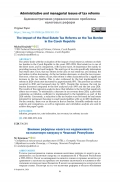The article deals with the evaluation of the impact of real estate tax reforms on their tax burden in the Czech Republic in the years 1993–2024. Real estate tax is one of the direct taxes, and in comparison, with income taxes, its importance lies mainly in providing income for local budgets. The unit type of tax rate specifically determines real estate rates. Facts, that tax reform in the area or real estate tax are minimal, the tax burden is often decreasing. As the tax burden decreases, so does the tax revenue. However, when tax reform occurs, this reform is often characterized by a significant increase in the tax burden. This is also evidenced by the last implemented tax reform in 2024 when rates increased by approximately 80%. The previous tax reform occurred in 2010 and increased rates by 100%. Despite this increase, the real tax burden decreased compared to the first analysed year 1993 and the last year 2024. The results of the regression analysis show that inflation is the factor that negatively affects tax revenue. To minimalize a decrease in tax revenue from 2024, a provision containing an inflation coefficient is implemented in the legislation as part of the 2024 reform. Conversely, a reduction in the tax burden was not found for real estate intended for permanent housing in small municipalities with up to 600 inhabitants. On the contrary, there was an increase in the tax burden. Scientific methods such as analysis and comparison, as well as regression and correlation analysis are used to achieve the paper’s goals.
